Filter by
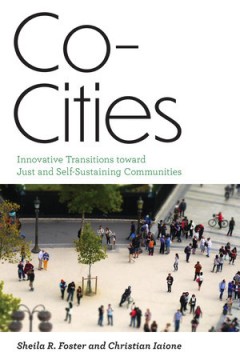
Co-Cities: innovative transitions toward just and self-sustaining communities
"A new framework for experimental and innovative "city-making" for urban resources and services to be developed and governed in a collaborative, socially, and economically inclusive ways"--OCLC-licensed vendor bibliographic record.
- Edition
- -
- ISBN/ISSN
- 9780262369930
- Collation
- 1 online resource.
- Series Title
- -
- Call Number
- -
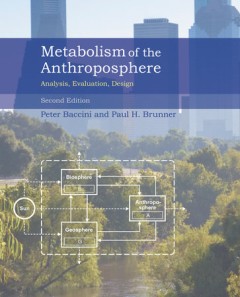
Metabolism of the anthroposphere: Analysis, evaluation, design
Over the last several thousand years of human life on Earth, agricultural settlements became urban cores, and these regional settlements became tightly connected through infrastructures transporting people, materials, and information. This global network of urban systems, including ecosystems, is the anthroposphere; the physical flows and stocks of matter and energy within it form its metabolis…
- Edition
- 2nd ed.
- ISBN/ISSN
- 9780262301329
- Collation
- 1 online resource (x, 392 pages) :illustrations, maps
- Series Title
- -
- Call Number
- -
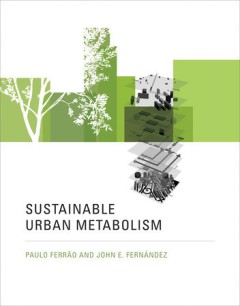
Sustainable Urban Metabolism
A unified framework for analyzing urban sustainability in terms of cities' inflows and outflows of matter and energy. Urbanization and globalization have shaped the last hundred years. These two dominant trends are mutually reinforcing: globalization links countries through the networked communications of urban hubs. The urban population now generates more than eighty percent of global GDP. Cit…
- Edition
- -
- ISBN/ISSN
- 9780262316958
- Collation
- 1 online resource (xiii, 244 pages) :illustrations
- Series Title
- -
- Call Number
- -
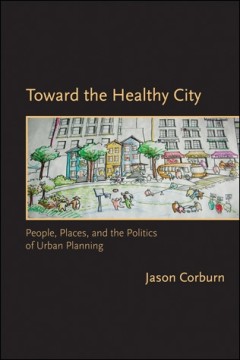
Toward the healthy city People, Places, and the Politics of Urban Planning
A call to reconnect the fields of urban planning and public health that offers a new decision-making framework for healthy city planning.
- Edition
- -
- ISBN/ISSN
- -
- Collation
- 1 online resource (ix, 282 pages) : illustrations, maps.
- Series Title
- -
- Call Number
- -
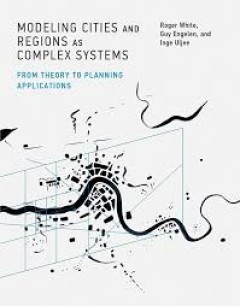
Modeling cities and regions as complex systems : from theory to planning appl…
"Cities and regions grow (or occasionally decline), and continuously transform themselves as they do so. This book describes the theory and practice of modeling the spatial dynamics of urban growth and transformation. As cities are complex, adaptive, self-organizing systems, the most appropriate modeling framework is one based on the theory of self-organizing systems -an approach already used i…
- Edition
- -
- ISBN/ISSN
- 9780262331388
- Collation
- 1 online resource (354 pages)
- Series Title
- -
- Call Number
- -
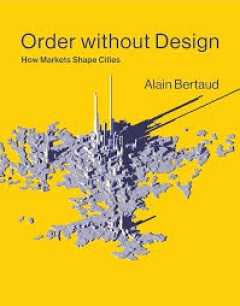
Order without design how markets shape cities
"This book emerges from a 55-year career in urban planning, and is illustrated by the author's real-world experience. Without understanding how markets work, urban planners are likely to design infrastructure and regulations that will adversely impact the functioning of cities. By contrast, urban economists review decisions and outcomes after the fact, often publishing their conclusions in spec…
- Edition
- -
- ISBN/ISSN
- 9780262349215
- Collation
- 1 online resource.
- Series Title
- -
- Call Number
- -

Just urban design :the struggle for a public city
"A critical examination of the role and scope of urban design in creating more just and inclusive cities"--OCLC-licensed vendor bibliographic record.
- Edition
- -
- ISBN/ISSN
- 9780262371087
- Collation
- 1 online resource.
- Series Title
- -
- Call Number
- -

The new science of cities
A proposal for a new way to understand cities and their design not as artifacts but as systems composed of flows and networks.In The New Science of Cities, Michael Batty suggests that to understand cities we must view them not simply as places in space but as systems of networks and flows. To understand space, he argues, we must understand flows, and to understand flows, we must understand netw…
- Edition
- -
- ISBN/ISSN
- 9781461950332
- Collation
- 1 online resource (xx, 496 pages)
- Series Title
- -
- Call Number
- -

Toward the healthy city :people, places, and the politics of urban planning
A call to reconnect the fields of urban planning and public health that offers a new decision-making framework for healthy city planning.OCLC-licensed vendor bibliographic record.
- Edition
- -
- ISBN/ISSN
- 9780262258685
- Collation
- 1 online resource (ix, 282 pages) :illustrations, maps.
- Series Title
- -
- Call Number
- -
 Computer Science, Information & General Works
Computer Science, Information & General Works  Philosophy & Psychology
Philosophy & Psychology  Religion
Religion  Social Sciences
Social Sciences  Language
Language  Pure Science
Pure Science  Applied Sciences
Applied Sciences  Art & Recreation
Art & Recreation  Literature
Literature  History & Geography
History & Geography